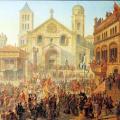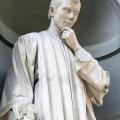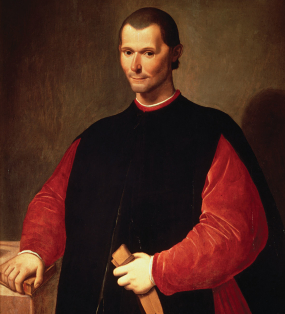349. No More Mr Nice Guy: Machiavelli
Machiavelli’s seminal work of political advice, The Prince, tells the ruler how to be strong like a lion and cunning like a fox.
Themes:
• A.H. Gilbert (trans.), Niccolò Machiavelli: Chief Works and Others, 3 vols (Durham: 1965).
• Q. Skinner and R. Price (eds), Niccolò Machiavelli: The Prince (Cambridge: 1988).
---
• E. Benner, Machiavelli’s Prince: A New Reading (Oxford: 2013).
• N. Capponi, An Unlikely Prince: The Life and Times of Machiavelli (Cambridge: 2010).
• F. Chabod, Scritti su Machiavelli (Turin: 1964).
• C.S. Celenza, Machiavelli: A Portrait (Cambridge: 2015).
• M.L. Colish, “Republicanism, Religion, and Machiavelli’s Savonarolan Moment,” Journal of the History of Ideas 60 (1999), 597-616.
• M. Coyle (ed.), Niccolò Machiavelli's The Prince: New Interdisciplinary Essays (Manchester: 1995).
• J.M. Najemy, The Cambridge Companion to Machiavelli (Cambridge: 2010).
• C.J. Nederman, “Amazing Grace: Fortune, Thought, and Free Will in Machiavelli’s Thought,” Journal of the History of Ideas 60 (1999), 617-38.
• C.J. Nederman, Machiavelli (Oxford: 2009).
• Q. Skinner, Machiavelli (Oxford: 1981).
• C. Vivanti, Niccolò Machiavelli: An Intellectual Biography (Princeton: 2013).
• C.H. Zuckert, Machiavelli’s Politics (Chicago: 2017).
Stanford Encyclopedia: Niccolò Machiavelli







Comments
Reception of Aristotle episodes?
Hello Professor, I hope you and your loved ones are doing well under the current pandemic/Quarantine situation.
I just wanted to ask how many episodes left until we reach Italian renaissance reception of Aristotle? You're covering Republicanism before you touched Renaissance Logic/University based on tentative episodes list.
Seems like you will be covering this route at the moment;
Machiavelli (2 scripted + Skinner interview)
Italian Utopia (Ludovico Zuccolo, Francesco Doni &Francesco Patrizi)
Economics thought (Benedetto Cotrugli and San Bernardino da Siena)
Renaissance Legal thought
History Writing (Francesco Guicciardini and Bernardo Segni)
Renaissance Logic
Renaissance Universities (Blasius of Parma and Pomponio Leto)
Followed by episodes on Aristotelianism/Averrosim ?
In reply to Reception of Aristotle episodes? by dukeofethereal
Reception of Aristotle
Wow, thanks for paying such close attention. We're close to the series of episodes on Italian scholasticism and Aristotelianism/Averroism, this will kick off after the summer break in September with episode 355. I am ahead writing scripts so the one I am writing now is actually 354 on economics and then we'll get into the scholastic material. Those episodes will go like this, I think:
355 Italian Renaissance Universities
356 Aristotle in Renaissance Italy
357 Interview: David Lines on reception of Aristotle's Ethics
358 Paduan Aristotelianism
359 Pomponazzi and Nifo on the Soul
360 Interview: Dag N. Hasse on reception of Islamic learning
And then the Italian Renaissance will wind up with another miniseries on the sciences: Cardano and mathematics, medical topics, the anti-Aristotelian physics of Telesio and Campanella, astronomy/astrology and magic, ending with Bruno and finally Galileo. Or something like that.
Oh by the way I decided against the episode on legal thought.
In reply to Reception of Aristotle by Peter Adamson
Regarding Legal thought
Regarding Legal thought episode, it would be better to have that in the reformation section (Alberico Gentili living in England, De Vitoria's Just law regarding colonised natives and Hugo Grotius = 3 figures of early international law)
So it seems like Zabarella will be included in Episode 356 as a thematic figure?
So just to clarify, before the summer break you will cover hopefully Machiavelli Scripted Part 2, Machiavelli Interview, Renaissance Logic, Renaissance Utopia and Renaissance Economics? History writing will be saved as a miniseries towards the end after Italian scholaticism/averrorism?
In reply to Regarding Legal thought by dukeofethereal
Law etc
Right, there will be quite a lot of legal theory in the Reformation part actually, there is also Pufendorf for example.
History writing is coming up soon actually, that is the end of the Machiavelli miniseries - Renaissance logic will not have its own episode, but will be covered while I do the universities, I think. To be honest I still need to look into what to cover for logic, because I already did Paul of Venice to some extent back in the medieval episodes.
Missed Opportunity
Hello Dr. Adamson. Been marathoning the podcasts to get caught up and while this was an excellent episode, I have one complaint: this should've been the episode where you played 2Pac's Hail Mary (which he performed under the name, that's right, Makevelli). A little humor for the day.
In reply to Missed Opportunity by Ken
Hail Mary
Sorry, I am from Boston and grew up in the 80s so the only Hail Mary in my heart is Doug Flutie's.
In reply to Hail Mary by Peter Adamson
Hail Mary
Sorry, I have nothing substantial to comment here except - these comments here just made my day? (including the prior one about the right sequence of the next episodes)
The Prince
Hello Peter
In one of Nigel Warburton's introductory books, he wrote that Machiavelli might be writing ironically. That opened my mind a little. It hadn't occurred to me that some of these learned, sombre, great white dead men may have subtly been taking the mick. Or that these great books may be fundamentally misread and misunderstood. However, unless I missed it, you don't mention this possibility in three episodes. That's despite commenting in podcast 354 at about 14:30: "but I'll say it again, this is the 15th century and humanists are delighting in irony and literary gamesmanship". That's been a characteristic of recent episodes. (Recent for me).
While looking up some stuff for a comment on podcast 354, I can see that Erica Benner takes the ironic view. She wrote in The Guardian, "Have We Got Machiavelli All Wrong":
"If Machiavelli did send the Medici The Prince, which seems unlikely, he could not have expected them to take its “advice” – to bribe, swindle, and assassinate one’s way to power – as gifts of friendly wisdom. Nor would it have helped his cause that he addresses the Medici as “princes” in his dedication, and insists on their remoteness from the people. Just like modern dictators, the Medici were keen to keep up the fiction that they were mere “first citizens” in Florence’s republic, not monarchs or tyrants. Calling them princes was an audacious piece of cheek. No wonder readers of The Prince in the early modern era – philosophers such as Francis Bacon, Spinoza and Rousseau – had no doubt the book was a cunning exposé of princely snares, a self-defence manual for citizens. “The book of republicans,” Rousseau dubbed it."
It seems you dismiss the ironic interpretation as not worth mentioning, if so, why so? I don't know enough to think that it should be mentioned, but I'm interested in the reasoning behind that choice.
In reply to The Prince by Scheming in the UK
Irony
I guess one can't rule out such an ironic reading entirely, but I think that it seems pretty unlikely in the context of his thought as a whole. Like, if you read the Discourses you see lots of connections to the Prince, as I hope I made clear, and the way the Prince uses history is also a lot like the Discourses. But it seems inconceivable that the Discourses is ironic in the way you are suggesting. Furthermore, there is just so much in the Prince that doesn't make sense as mere irony, like the handling of the theme of greatness. Actually much less of the Prince is horrible and cynical than people remember - it is more like scattered passages. So we are not dealing with a text like Swift's Modest Proposal here. A more plausible idea might be that some aspects of the Prince are ironic, but I would need to see how that would be worked out in detail: which passages and why.
In reply to Irony by Peter Adamson
Surprised
I must admit I was also surprised to hear little to no controversy on this issue. In pop history and in casual conversations or podcasts I've heard all of the following:
The Prince & Discourses were both satire (as the guardian article the above user mentioned suggests)
The Prince was written ironically and for the people, and the discourses are what he truly wants,
The Prince was written to suck up to de Medici, and discourses was written when he felt more secure (both of these with the suggestion that discourses are pro republic and the prince is anti)
The Price was written for a new prince (of a new government), and Discourses was written for a well established government. (again, wit the suggestion that they differ significantly)
As well as disagreements on if it was meant to apply to leaders to all people, or just some. To leaders all the time, or just when leading. Or to all people, or just leaders.
Are these issues not as hotly contested amongst historians of renaissance philosophy?
In reply to Surprised by Alexander Johnson
Machiavelli's irony
Well, obviously the scholarship on this is vast but when I was reading up on the Prince (and I did read quite a bit) I don't think I saw any serious discussion of whether the whole thing is ironic or a Swift style joke. He was definitely sucking up to the Medici, as I think I did mention, but to be frank pretty much all Italian Renaissance literature was written in part for the sake of currying favor with patrons so that doesn't mean much in terms of the interpretation. But your point about new vs established government is more promising, I think, as a key to understand the relationship between the two works.
As I say I think in any case that the contrast between the Prince and Discourses should not be overstated; as we saw in the podcasts they can be pretty readily seen as cohering into a consistent political theory, albeit with differences of emphasis which could indeed be owing to the occasions and audiences for which they were written.
lacking one of the central points of the book and his background
This episode completely skips over the importance of machiavelli's experience as a diplomat and his role during the brief Republic of Florence. It doesn't emphasize his preference for republics, and doesn't discuss sufficiently the central point of the book which is his ideal for a unified italy. the episode doesn't really deviate from the misunderstanding of machiavelli. this may be discussed on the next episodes, but it really should be prefaced.
In reply to lacking one of the central points of the book and his background by silvia
Machiavelli
Well, the whole next episode is about his views on republicanism, so obviously I gave that plenty of attention. In this episode it is in fact already mentioned (e.g. where I say "As he will also observe in the Discourses on the basis of Roman history, the most skilled and lucky autocratic ruler is only going to achieve in the short run what a free republican government may be able to achieve in the longer run." The previous episode was also about republicanism more generally by the way.
As for unifying Italy this episode ends like this: "In the final chapter of The Prince, in which he encourages Lorenzo to liberate all of Italy, Machiavelli seems to be casting his prospective patron as a religious and military leader, a man wielding the two swords of faith and violence. Just as Moses led his people from slavery in Egypt, Lorenzo should bring liberation to Italy and defend its cities from foreign exploitation. If he takes Machiavelli’s advice on how to establish himself as a prince, he may succeed in this where others have failed."
So, I think we pretty much see eye to eye on all this, though I'm not sure I agree that the ideal of a unified Italy is "the central point"; it is the culminating point, as I say here. But I think the central point is the nature of political rule and the attributes and outlook a "prince" must have to deal with human nature and fortune, which constantly tend to undermine stable leadership.
In reply to Machiavelli by Peter Adamson
Agreed, culminating point…
Agreed, culminating point more than a central point. You do touch upon all of it, but to people not well versed on Machiavelli, which I assume many of your listeners are not, I think a lot of that may be lost. I of those episodes. I don't really notice where it highlights his time as a diplomat, his resume, which so shapes him ...and his love for republicanism.
on a totally separate note, as an Italian I ask you please look up the correct pronunciation of Girolamo and Cesare ;)
Thank you for all you do. your podcast changes my life for the better, years ago.
Add new comment